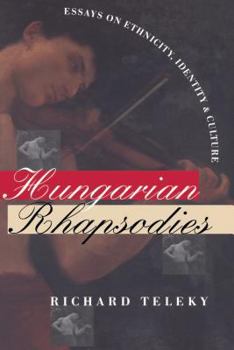Hungarian Rhapsodies: Essays on Ethnicity, Identity, and Culture
Select Format
Select Condition 
Book Overview
Like the renowned American writer Edmund Wilson, who began to learn Hungarian at the age of 65, Richard Teleky started his study of that difficult language as an adult. Unlike Wilson, he is a third-generation Hungarian American with a strong desire to understand how his ethnic background has affected the course of his life. "Exploring my ethnicity," he writes, "became a way of exploring the arbitrary nature of my own life. It was not so much a...
Format:Paperback
Language:English
ISBN:0295976063
ISBN13:9780295976068
Release Date:May 1997
Publisher:University of Washington Press
Length:256 Pages
Weight:0.70 lbs.
Dimensions:0.6" x 5.7" x 9.3"
Grade Range:Postsecondary and higher
Customer Reviews
2 ratings
Fills a niche for Hungarian expats and non-Magyars too
Published by Thriftbooks.com User , 21 years ago
Due to the linguistic isolation of Hungarian, its cultural and literary wealth has become trapped in a Slavic and Germanic slurry surrounding its terrain. Teleky, as a Canadian/American third-generation Hungarian, seeks to fit his understanding into the familiar pattern of the ethnic revival of interest among those far removed from their original homeland. As an Irish American myself, I found his searches appealing to me also; the comparisons and contrasts among different sensibilities and the struggles to regain our grasp on difficult ancestral tongues brought his essay on learning Hungarian close to my mental home.His chapters on stereotypes and Joe Esterhazy's film "The Music Box" I found particularly impressive for their mix of erudition and unforced satirical/incisive commentary. Dismantling the kitsch and tchotkes assembled by expats and Hollywood seems to be a notable skill for Teleky, and makes for his best work here.For an academic, he writes surprisingly well! That is, his essays aim for the "educated general reader" instead of the professoriate. Always clear, modest, and focusing upon the subject more than himself--even when the subject is himself! Many nationalities feature such essayists seeking to connect themselves back to their roots; Teleky's collection appears to me--as an outsider to this nation's studies--to fill this necessary niche in the Hungarian section of the few English-language studies found on most library or bookstore's cultural shelf. For those of us not able to enter into the Magyar language, Teleky's crossing of the boundary between the Anglophone world and the Hungarian realm shows how valuable that encounter can be. I give this book four, not five, stars only because of personal bias; some of the essays--however clearly conveyed--simply failed to grab me. I doubt, for instance, that after reading Teleky on Peter Esterhazy's daunting post-modern novels I'll rush out to read any. Teleky's promotion of Esterhazy seems a bit half-hearted, as if many of this novelists' tricks dazzle less once his legerdemain has been revealed as imitations of other European literary magicians over the past century or so.Not that many revelations await him, for instance, when he finally journeys to Hungary in 1993 for the first time. But his refusal to glamorize or over-interpret what he sees is refreshing. He keeps his perspective and sense of humor. And of balance. By avoiding theorizing and refusing to inflate his own stature as an observer, he offers honest essays each "assaying" the value of the little treasures and trinkets he puts under scrutiny as we watch.I'd also recommend Monica Porter's "The Paper Bridge" for another expat's visit for a month circa 1980, and Zsuzsanna Ardo's "Culture Shock: Hungary" for two other books interpreting Hungarian mores and sensibilities for the rest of us, whatever our bloodlines.
Inspiring and well-written
Published by Thriftbooks.com User , 23 years ago
I heartily recommend this book of essays to expatriate Hungarians and the people close to them as well as second- and third-generation Hungarians with a less firm grasp on what their Hungarian-ness might mean to them. As a Hungarian expatriate living in the U.S. and married to a second-generation Hungarian American, I find Richard Teleky's well-executed essays, which he wrote in an attempt to come to terms with his ethnic identity, very interesting and thought-provoking. Teleky whose grandparents were Hungarian, learnt this difficult language as an adult, following which he set out to visit his forebears' native country and, subsequently, to write about his experiences there, the conversations he conducted with newly acquired friends and distant relatives and reflections on how all this has come to shape his thoughts about his own identity. In my opinion, Teleky, an academic, is at his best when he is most personal. In "Toward a Course on Central European Literature in Translation," he describes, to great comic effect, his experiences teaching a literature course to an initially unknowing group of students who, one feels, by the end of the course -- and the story -- have grown both more mature and open-minded. "What Comes After" and "The Third Generation and the 'Problem' of Ethnicity," the last two essays in this collection, sum up what Teleky has learnt in the worthwhile quest for his connection to a Central European identity. I came away inspired to pose new questions and continue my own quest in a similar spirit, feeling that the five years Teleky put into working on this book enriched his life and deepened his self-understanding. Some of the other outstanding pieces focus on literature: "The Poet as Translator: Margaret Avison's 'Hungarian Snap'" and "Introducing Peter Esterhazy" both testify to Teleky's love of first-class literature and sensitive feeling for this language and the culture in which it is embedded.






